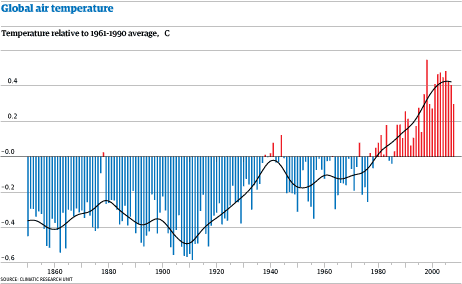The climate story of the decade is that the 2000s are on track to be nearly 0.2°C warmer than the 1990s. And that temperature jump is especially worrisome since the 1990s were only 0.14°C warmer than the 1980s (see datasets here). Global warming is accelerating, as predicted.

The UK’s Guardian, on the other hand, believes the big climate story is “2008 will be coolest year of the decade*.” The deniers have begun pushing this meme, as Greenfyre notes here. [Even that meme assumes the decade began in 2001 — since 2000 was quite cool — a view mostly shared be the few dozen people who didn’t celebrate at a millennial New Year’s party December 31, 1999.]
Climate is about long-term trends. Perhaps the most interesting fact is that 2008 is on track to be almost 0.1°C warmer than the decade of the 1990s as a whole – and warmer than any year of last century beside (the El-Niño-enhanced) 1998.
The decade of the 2000s — 2000 to 2009 — will almost certainly be the hottest decade in at least 2000 years (see “Sorry deniers, hockey stick gets longer, stronger: Earth hotter now than in past 2,000 years“):
[The asterisk in the headline stands in for the word “probably” since it is common to report on the temperature for the year based on the first 11 months. I have extended that approach in this post to report on the temperature for the whole decade based on the first 9 years.]
And yes, this post is based on the temperature data from NASA’s Goddard Institute for Space Studies. Despite the best efforts of the deniers to discredit NASA by focusing on trivial issues (see “The hottest October on record?” and “Must read from Hansen: Stop the madness about the tiny revision in NASA’s temperature data!“), I will always use the GISS data because:
- I know many of the GISS scientists personally and know them to be researchers of the first rank, for whom, like the overwhelming majority of climate scientists, nothing is more important than data integrity, reproducibility of results, and the search for the truth. That’s why, unlike the vast majority of deniers who attack them, they are completely open about what they do, admit mistakes immediately, and don’t keep repeating things that have been long debunked in the scientific literature.
- The NASA data probably underestimates recent warming, since as previously noted, “there are no permanent weather stations in the Arctic Ocean, the place on Earth that has been warming fastest . The UK’s Hadley Centre record simply excludes this area, whereas the NASA version assumes its surface temperature is the same as that of the nearest land-based stations.” To ignore the Arctic warming is to have a blind eye to the astonishing recent reductions in Arctic ice decades ahead of climate model forecast and to the equally astonishing recent net loss of Greenland ice mass “100 years ahead of schedule.”
That said, the Hadley data is quite solid. And even if it almost certainly underestimates recent warming, the warming signal is still unmistakable in their data, as the figure below (which includes 2008) makes clear:
Using their data (here) also makes clear that the 2000s will easily be the hottest decade in recorded history, and that 2008 will be also be almost 0.1°C warmer than the decade of the 1990s as a whole.
The Guardian does note that 2008 is quite a warm year by historical standards. It “would have felt like a warm year” even in the 1980s and “would have been a scorcher in Charles Dickens’s time.” Still, the Guardian continues to misreport recent work on near-term warming projections:
In March, a team of climate scientists at Kiel University predicted that natural variation would mask the 0.3C warming predicted by the Intergovernment Panel on Climate Change over the next decade. They said that global temperatures would remain constant until 2015 but would then begin to accelerate.
No. No. No. How many times must I explain what the study actually said (see “Nature article on ‘cooling’ confuses media, deniers: Next decade may see rapid warming“)? With the general caveat from the authors that the study as a whole should be viewed in a very preliminary fashion, and should not be used for year-by-year predictions (and the specific caveat that the study has myriad flaws), it is more accurate to say the Nature study is consistent with the following statements:
- The “coming decade” (2010 to 2020) is poised to be the warmest on record, globally.
- The coming decade is poised to see faster temperature rise than any decade since the authors’ calculations began in 1960.
- The fast warming would likely begin early in the next decade — similar to the 2007 prediction by the Hadley Center in Science (see “Climate Forecast: Hot — and then Very Hot“).
So for all the deniers and delayers touting the coolest year of the decade (if the decade starts in 2001) meme, I stand by my offer to bet $1000 that the decade from 2010 to 2019 will be warmer than the decade from 2000 to 2009. I’ll even give you 2-to-1 odds or spot you 0.1°C. And I’ll even agree to use the HadCRUT3 global mean surface temperature data set (but, no, I can’t agree to use the satellite data, since it covers parts of the atmosphere that are projected to cool). [via climate progress]






